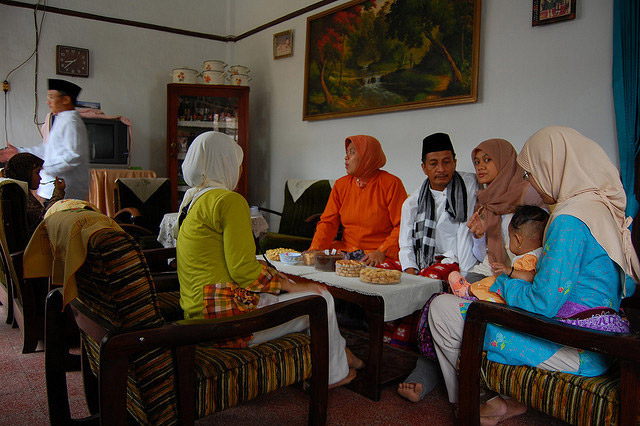When you think about `Eid, the words that first come to mind are probably not healthy, safe, nutritious and peaceful. However, focusing on these words can help make your `Eid the best one you’ve ever had.
As a guest at an `Eid gathering, you should be aware that there are a number of herbs that can balance the rich foods you will eat, prevent flatulence and bad breath and keep your immune system strong.
Eat Wisely
As a guest, you often don’t have a choice as to what you eat or drink. However, awareness can help combat the most common “eating mistakes”. If your digestive system is compromised in any way you may experience pain, flatulence, bad breath or even heartburn.
The first preventative measure you can take is to make sure that you take small bites and chew your food thoroughly. Make sure you drink plenty of water before and after your meal. Another tip is to walk to and from the event. Walking is one of the best and least expensive digestive aids you can make use of.
At a party, foods may be laid out at a buffet table or snacks may be served before the meal. Resist the temptation to start with the sweets and meats and remember to always start your meal with raw vegetables or salad.
These raw vegetables help prepare the digestive juices in the mouth and stomach so they are ready to digest heavier foods. Beyond this, you can also take some herbs before and/or after the event. Herbs like fenugreek, ginger, turmeric, garlic, fennel, cumin, dandelion, milk thistle and mint all help the digestive system in different ways.
Strengthen Your Immune System

Another danger of attending an event with large groups of people is the chance that you might “catch” something that someone else has.
This is especially true during `Eid celebrations where many people may have come from the Hajj or travels and have been exposed to a great number of illnesses.
The danger compounds when you realize that the incubation period for many illnesses starts before the worst symptoms present themselves.
To strengthen your body against viral attacks you should make sure you drink plenty of water and get plenty of sleep before the event. Sleep deprivation and dehydration are among the leading causes of a compromised immune system.
Other things that compromise your immune system include eating too much sugar, monosodium glutamate (MSG), foods with artificial colors or flavorings, as well as stress, pollution, recent vaccination, and exposure to a previous illness or being ill.
The time to take immune system enhancing herbs is not after you “catch” something, but before you do. Beneficial herbs include Echinacea, garlic, astragalus, licorice, bupleurum, ginseng, thyme, burdock, shiitake mushrooms, lavender, bergamot, lemon, tea tree, rosemary, black pepper, cardamom, Gotu kola, kelp, dandelion, and ginger.
Keep Your Guests Healthy

As an event host, you can do a number of things to keep your guests healthy and happy. Consider serving healing beverages instead of popular ones like sodas that actually compromise the digestive and immune system.
Consider freshening the air with essential oils that heal, instead of artificial scents that can actually cause allergic reactions and lowered immune system function in some people.
Last, but not least, the extra expense of healthier ingredients in your food could make a big difference in the health of your guests.
Depending on where you live, you need only to turn to tradition to find the most suitable beverages. Many traditional drinks like karkade (hibiscus) from the Middle East, Abre or Tabrihana (a slightly sweetened fruit juice) from Sudan, Lassi (yogurt smoothie) and chai (tea) from India are extremely beneficial to the immune system and digestive system.
It is no mistake of history that these drinks have been popular at gatherings for many years. As they are replaced with modern drinks like sodas and vitamin waters, the health risks for your guests increase.
Flavored lemonades like mint, rosemary or ginger lemonade are often popular with guests and fresh juice never goes out of style. Consider serving fresh-squeezed lemonade, orange juice or tangerine juice.
To freshen the air you can also look to tradition. In many countries, it has been traditional for centuries to burn incense during large gatherings. To many modern individuals, this may seem like a quaint custom.
However, burning incense has an important place in the prevention of the spread of disease. Many pure types of incense can be burned on coals in an incense burner. Some of the most popular substances to burn are roots, resins, and woods.
Frankincense and myrrh are popular in Egypt; sage is used in Native American cultures, spikenard in India and Japan and aloes wood in Vietnam and other countries. It is best to purchase the best quality incense in pure form (not sticks) to make sure you have a pure natural substance to burn.
Many modern incense “sticks” contain artificial perfumes and ingredients and could actually be harmful to your guests.
You can also burn aromatherapy oils such as thyme, lemon, lavender, tea tree, or ginger to enhance moods and immune systems at your party.
Many essential oils have emotional as well as physical properties. When mixing your own essential oil mixture be sure to choose scents that would be pleasant for your guests, as well as scents that would enhance mood, depending on the needs of your gathering.
Lemon and other citrus can enhance moods and be uplifting so this would be a good oil to burn in the evening, after a long day of gatherings and celebrations.
Grapefruit can help people socialize and bergamot can enhance more positive energy in the air.
Lavender or rose oil can relax your group and perhaps even help smooth over family tensions or help “break the ice” in groups where a lot of the guests do not know each other.
Last, but not least, consider the ingredients you use in your cooking. If your meal includes a lot of fried foods, you might consider baking some of these foods instead.
Use natural dried or fresh spices and sea salt to flavor your dishes and stay away from “flavoring packets”, MSG and spices that come in small bottles at the grocery store.
Use fresh garlic, ginger, and onions in cooking instead of dried versions of these spices. Your salad dressings should be vinegar-based instead of creamy or store-bought. Good vinegar has a number of health benefits including being able to enhance the digestive system.
Choose honey over sugar for tea and some baked goods and use naturally dried cane sugar instead of white beet sugar for your other baked treats.
Whether you are a guest or a host/hostess remember, above all, that the Qur’an and Hadith will always provide guidance for many events in your life and that hosting or attending `Eid gathering is no exception.
In the Qur’an Allah (SWT) states “… eat and drink: But waste not by excess, for Allah, loveth not the wasters.” (Surat Al-A’raf: 7:31).
Prophet Mohammed (peace and blessings be upon him) advises that “The son of Adam will never fill a container with something worse and evil than his stomach. It will suffice him some morsels (food) that will keep him on his feet, otherwise, he should divide his stomach into three parts: one third for his food, the other for his drink and the other third for his breath.” (Ibn Hibban).
This article is from our archive, originally published on an earlier date, and currently republished for its importance.
References:
- Alleman, Gayle A. “Health Benefits of Vinegar.” TLC. 2009. Accessed 21 Nov. 2009.
- Keville, Kathi, and Korn, Peter. “Herbs for Health and Healing.” Rodale Press. USA. 1996.
- Lambert, Craig. “Deep into Sleep.” Harvard Magazine. July 2005. Accessed 21 Nov. 2009.
- Lasalandra, Michael. “The Sensitive Gut.” Harvard Medical School Publications. USA. 2001.
- McGrath, Henry. “Digestive Disorders.” Henrymcgrath.com. Accessed 21 Nov. 2009.
- Snyder, O.P.”Illnesses of Viral Origin.” Hospitality Institute of Technology and Management. USA.1999.
- ” Vasey, Christopher. “Water Prescription.” HeartSpring. Accessed 21 Nov. 2009.